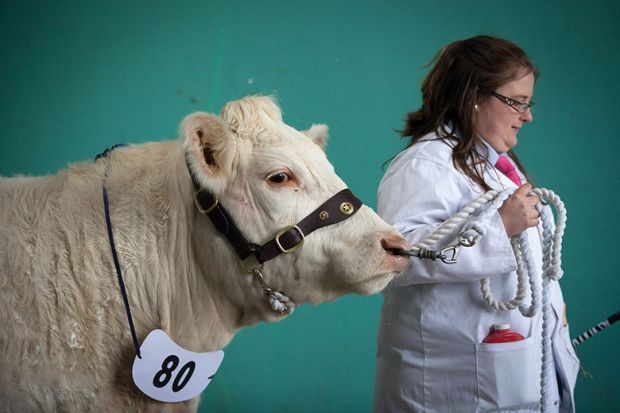Attracting young people to work in the British countryside is proving an uphill struggle: just 3 per cent of UK farm holders are under 35, with the average age now at 59 and rising.
Post-Brexit, the task looks even tougher. Last summer, some farms had to leave fruit rotting in the fields after they struggled to find seasonal workers from eastern Europe to pick it. At the same time, uncertainty about government subsidies has done little to encourage optimism in an agricultural sector that employs nearly 500,000 people; without direct payments, almost half of UK farms (42 per cent) would make a loss, a government analysis published in March showed.
However, some within the industry, which is worth £23 billion annually, are choosing to look more positively at the UK’s imminent withdrawal from the European Union.
“Agriculture is the sector that is arguably most affected by Brexit, but we have decided to see it as an opportunity,” explained Joanna Price, vice-chancellor of the Royal Agricultural University, which has launched a £2.5 million project to help meet the needs of the land management and agri-food sectors in the post-Brexit era.
As part of the initiative – which also involves the Countryside and Community Research Institute at the University of Gloucestershire as well as the University College of Estate Management – some £1.1 million was awarded by the Higher Education Funding Council for England in its last few months through its Catalyst Fund to create new qualifications to attract more students into agriculture.
New intensive two-year degrees, online learning opportunities and postgraduate courses, which will be developed with industry partners, will give those working in other sectors the chance to get involved in agriculture, said Professor Price, who became the Cirencester institution’s first female head when she joined in September 2016 from the University of Bristol’s Veterinary School.
“People often think about agriculture as simply working on the land, but there are many other roles along the whole supply chain of food that require specialist skills,” Professor Price told Times Higher Education, giving as an example “someone from banking who wants to move into [food] logistics”.
Professor Price, who told the The Times last year that she wanted to shed the institution’s fusty image that it educates mainly “men wearing tweed jackets with leather patches and yellow cords”, said that the new suite of courses could help to diversify the university’s intake.
“We need to innovate and build a new infrastructure of accelerated degrees and part-time programmes delivered in a flexible way that will meet the needs of this sector,” she said.
Professor Price added that she hoped that agricultural studies would also be viewed more favourably by academia itself after Brexit, especially amid growing concerns about food security if the industry struggles to find sufficient staff.
“If we are going to be more productive and more self-sufficient after Brexit, we are going to have to use science and data to help agriculture and graduates working in the industry,” she said.
Too often, research centred on agriculture is seen as the poor relation of the more mainstream disciplines of science, technology, engineering and mathematics that make up “STEM”, Professor Price continued.
“Of all the subjects involved in science and technology, agriculture should be high up – it should certainly be seen as a STEM subject,” she explained.
“In the US and Europe, they talk about agriculture as a STEM subject, but there is a bit of an image problem about what agriculture means in the UK,” added Professor Price, suggesting that we should talk about “STEAM” subjects instead.
With academics now increasingly asked to demonstrate the impact of their research, this reluctance to engage with agricultural science – a tremendously industry-facing area – is likely to fade over time, Professor Price said.
“We are moving in the right direction with the greater emphasis on impact, but we’re trying to make up for lost time,” she said.
“We have not invested enough in research around this industry for a long time, but the type of funding for education that we’re seeing is a good example of how we can help this industry.”
POSTSCRIPT:
Print headline: One UK university expects Brexit to be fertile ground
Register to continue
Why register?
- Registration is free and only takes a moment
- Once registered, you can read 3 articles a month
- Sign up for our newsletter
Subscribe
Or subscribe for unlimited access to:
- Unlimited access to news, views, insights & reviews
- Digital editions
- Digital access to THE’s university and college rankings analysis
Already registered or a current subscriber? Login





